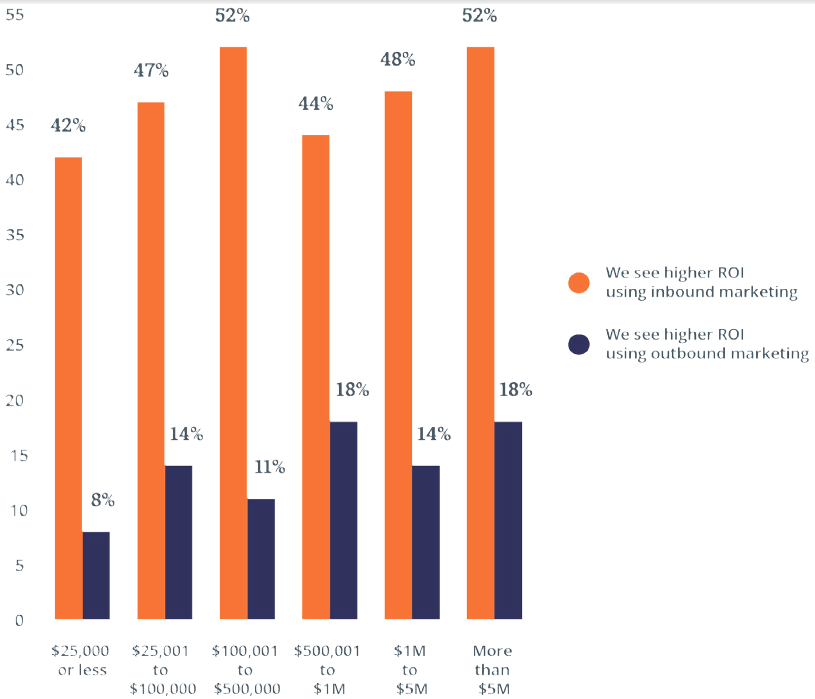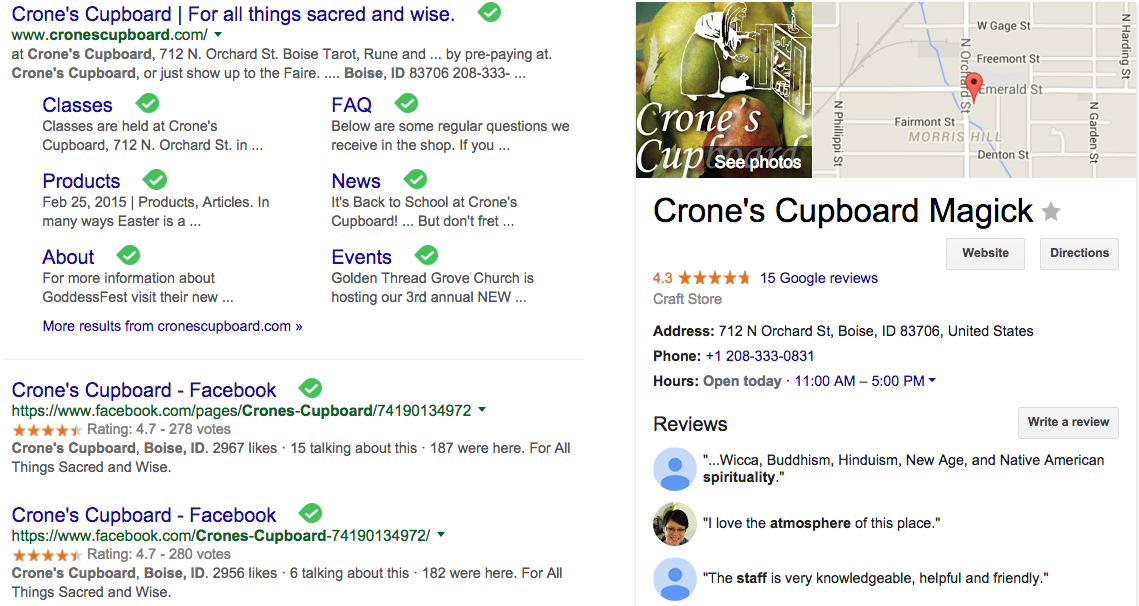Finding cost-effective ways to get publicity is one of the biggest challenges for small-to-medium businesses, especially considering that traditional (outbound) marketing tends to work better the more businesses invest in it financially:

Graph via Hubspot’s 2015 State of Inbound Report
At the same time, getting publicity is critical for SMBs because it helps build the brand awareness and ensure future growth.
Luckily, getting publicity doesn’t have to break the business budget. Here are 7 ways SMBs can increase their brand’s publicity at little or no cost.
1. Sponsor Local Events
Large brands will pay exorbitant prices to sponsor big events like the Super Bowl or World Cup, but that doesn’t mean the tactic isn’t valuable on a smaller scale as well.
Finding local events to participate in is a great way for SMBs to cultivate credibility, build brand awareness, engage with audiences and even generate new leads.
Try to look for opportunities to sponsor local events, such as a 5K run for a good cause or an annual festival. Giving product demonstrations or samples out at local trade shows or expos is another inexpensive way to get people interested in your business.
2. Get Listed
SEO is a big part of making sure your business is findable on the internet, but it’s not the only tactic.
Google My Business
If you haven’t already, set up a profile on Google My Business, where you can list important information like contact information, location, store hours, and more. Customers will go here to leave and read reviews. If your business is on Google+, you can even integrate it into the profile.
Your Google My Business will also show up in Google search results. For example, I searched for “Crone’s Cupboard Boise, ID”:

Screenshot from Google Search
The shop I’m looking for comes up as the first result, but half my screen is also taken up by the Crone’s Cupboard ‘My Business’ information, which basically serves as a giant digital ad for the business.
Other Directories
Here are some other directories that can help increase exposure:
Be sure to also be on the lookout for directories relevant to your specific business niche. A brewery, for example, would want to make sure they appear on the Original Craft Beer Directory and the Brewers Association Directory.
3. Write Press Releases
Getting the media to pick up on your business’ sales or events is difficult to achieve, but becomes nearly impossible if you don’t write and distribute press releases. There are a lot of free press release distribution sites out there, so there’s no reason why you should write them for news announcements, product launches and special discounts.
Even if it doesn’t seem like big news, it might get picked up by local news outlets, which are one of the main sources major news outlets go to find stories.
4. Get Off Your Platform
One of the best ways to build an audience and bring them to your own company’s website is by getting featured on other platforms. There are a lot of different ways to do this:
Ezine Articles
Write a high quality blog post on EzineArticles related to your niche, which the website then categorizes and sends out in an email newsletter to subscribers interested in topic. You can include a link back to your website as well.
Medium
When you have a small audience of your own, blogging for Medium is a great way to connect with readers and expand your reach.

Screenshot from Medium
Medium allows anyone to publish articles, but focuses on creating collections of the highest quality content out there, which they promote.
Guest Posts
If you can be considered somewhat of an expert in your business niche, there are many websites interested in having you write a guest post for them, which will include a bio and link back to your website.
This can be valuable for any size business, and you don’t have to write 100 of them before you start seeing results.
Consider Bryan Harris, leader of Video Fruit, a marketing consultant business. His very first guest post ever was on OKdork, and earned him:
- A daily site visit average of 285
- 1782 site visits during the first two days (73% were new visitors)
- 215 new subscribers (a 12% conversion rate)
Search Google for keywords like “guest post” and “write for us” with keywords related to your industry to find guest post opportunities.
Syndication
If you’ve already written a great piece on your own platform, you can put it out for syndication — republishing or featuring it on a high authority website. This will broaden your brand’s reach and help draw readers back to your platform. Here are some of the popular content syndication sites out there:
5. Create Unique Content
The first lesson most businesses learn about creating content is that it should help their audience and answer their questions. The second lesson is making sure the content stands out from the competition.
If you focus on offering something people can’t find elsewhere, it’s much more likely your content will be shared widely and generate more publicity.
Take Optum, a B2B company that managed to create more than 1000 pieces of unique content over a period of 18 months.

Image via Marketing Sherpa
Their efforts earned them:
- More than 9 million impressions
- Over 8,500 gated content downloads
- Campaign results 250% higher than their goals
Here are a few common ways to develop unique content:
Case Studies
Seek out past customers who had a positive experience with your business and feature them in a case study. Drawing on customers to develop content adds a certain credibility to what you produce, while people who are seeking reviews on your company will be directed to your website to find them.
Industry Data
If you can provide some new statistics on consumers in your industry, it’s much more likely to get picked up and quoted by others. And it’s actually pretty easy to do — just survey your customers and summarize their responses.
A New Perspective
Is there a topic that’s been discussed time and again in your industry? If you can develop a completely new perspective on it and back it up, it’s much more likely to get shared and discussed than someone charging on with an argument everyone’s heard again and again.
6. Use HARO
HARO, or Help a Reporter Out, is a platform that helps connect journalists with the sources they need for a story. It’s completely free, and journalists will often put out a query looking for a quote from someone with expertise or knowledge on a certain topic.
If you have experience in the field they’re writing about, you can be selected for an interview — a great way to get free publicity and position yourself as an expert in the industry.
7. Offer Discounts or Giveaways
People love free stuff, which is why holding a contest or giveaway is a great way to get some organic buzz going for your business, especially if you leverage social media to do it.
Post the details of the discount or giveaway to your social media platforms and website, and use it as a method to get people to engage with your brand. It can be something as simple as offering discounts in exchange for customer reviews, which is exactly what Emerson, a small salon in Washington, did on Twitter and Facebook.

Screen shot from Emerson Salon
The campaign resulted in:
- More than 13,000 Twitter followers
- 1780 Facebook likes
- A 75% increase in clients via the internet
- 400% increase in revenue (over 2 years)
The Takeaway
Many SMBs just don’t have the necessary budget to maintain a strong outbound marketing strategy. Luckily, there are a lot of ways to generate publicity without purchasing ads, that can help businesses reach a larger audience, generate leads, build credibility and increase brand awareness.
Need a content writer who can engage your audience?
I’m a freelance writer, providing blogs, articles, e-books, white papers and other marketing materials to help businesses broaden their reach and drive conversions. Email me to discuss your needs and get a custom price quote for my services.
